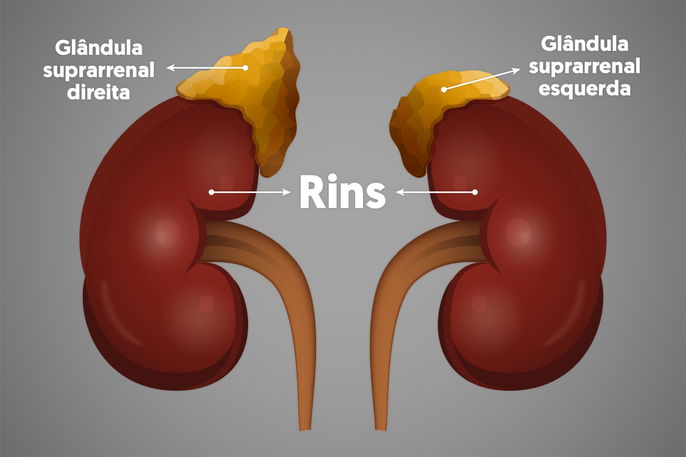Addison's disease is a condition in which the adrenal gland, which is located on top of the kidneys, stops producing cortisol and aldosterone. These hormones cortisol are essential for regulating stress, blood pressure and inflammatory processes in the body.
Addison's disease, also referred to as adrenal insufficiency, can happen in men or women of any age, but is most commonly diagnosed between 30 and 40 years old. It can be caused by several factors, such as prolonged use medications, infections or autoimmune diseases.
Treatment for Addison's disease is oriented by an endocrinologist, and is typically guided by the patient's presenting symptoms and hormone levels. It commonly involves the use of hormone replacement therapy and regular follow-ups.

Common symptoms
The main symptoms of Addison's disease include:
- Abdominal pain
- Weakness
- Fatigue
- Nausea
- Weight loss
- Anorexia
- Spots on the skin, gums and skin folds, called cutaneous hyperpigmentation
- Dehydration;
- Postural hypotension, which presents with to dizziness or fainting when standing up
Because symptoms are not specific and can vary from person to person, Addison's disease is often confused with other diseases, such as anemia or depression. This can cause a delay in diagnosis and treatment.
Confirming a diagnosis
Addison's disease is diagnosed by an endocrinologist through clinical, laboratory and imaging tests. a CT or MRI of the abdomen to visualize the kidneys, as well as a blood test to check sodium, potassium, ACTH (adrenocorticotropic hormone) and cortisol levels in the blood.
Also recommended: Cortisol Test: What It's For, Types, Normal Levels & Results tuasaude.com/en/cortisol-testIn some cases, an ACTH stimulation test can also be ordered. With this test, cortisol levels are checked before and after an injection of synthetic ACTH, to see how the adrenal glands respond to cortisol production when triggered.
Addison's disease is usually diagnosed in its more advanced stages, as adrenal gland damage is gradual and is difficult to identify early on
Possible causes
Addison's disease is usually the result of an autoimmune condition, which triggers the immune system to attack other tissues in the body, like the adrenal glands or kidneys.
However, it can also be caused by medications, cancer, fungal infections, bacterial infections, or viral infections, like blastomycosis, HIV and tuberculosis.
Treatment options
Treatment for Addison's disease typically involves the use of hormone replacement therapy to correct low hormone levels and manage symptoms. Some medications that your doctor may prescribe include:
- Cortisol or hydrocortisone
- Fludrocortisone
- Prednisone
- Prednisolone
- Dexamethasone
Treatment should be maintained as prescribed by an endocrinologist, and is usually life-long, as there is no known cure for Addison's disease. Nonetheless, with adequate treatment, symptoms are manageable. Many patients may also benefit from a diet that is rich in sodium, calcium and vitamin D to help reduce specific symptoms.






























